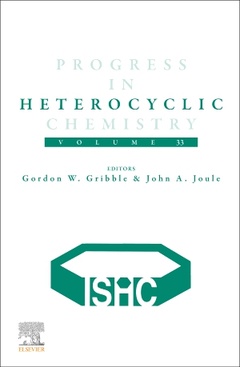Description
Progress in Heterocyclic Chemistry
Progress in Heterocyclic Chemistry Series
Coordinators: Gribble Gordon, Joule John A.
Language: English
Subject for Progress in Heterocyclic Chemistry:
Keywords
(Thio)Pyrans; 1; 2; 3-triazoles; 1; 2; 4-triazoles; 1; 2; 4-Trioxolanes; 1; 2; 4-Trithiolanes; 1; 2-Dioxolanes; 1; 3; 2-Dioxathiolanes; 1; 3-Dioxolanes; 1; 3-Dithioles; 1; 3-Oxathiolanes; 1; 3-triazines; 1; 4-triazines; 1; 5-triazines; 2-Azetidinones (ß-lactams); 2-Oxetanones (ß-lactones); 2H-azirine; Amino acid; Azaindole; Azaphilone; Azepines; Azetidines; Azetines; Aziridine; Benzoazepines; Benzodiazepines; Benzopyran derivatives; benzo[b]furans; Benzo[b]thiophenes; benzo[c]furans; Bioorthogonal chemistry; Bromine; C-H functionalization; Carbazole; Chlorine; Chromones; Cinnolines; Click chemistry; Coumarins; Cross-coupling reactions; Cyclizations; di- and tetrahydrofurans; Diastereoselective; Diazepines; Dioxanes; Dioxepines; Dioxetanes; Dioxolanones; Dithiepines; Dithiins; Dithiolanes; Enantioselective; Epoxide; Fluorescent materials; Four-membered silylenes; Furans; Fused nitrogen heterocycles; Fused rings; Imidazoles; Indole; Indoxyl; Isatin; Isoindole; Isoquinolines; Isoxazoles; Isoxazolidines; Isoxazolines; Metal catalysts; Multi-component reactions; Natural product; Natural products; Oligomers thereof; Organic frameworks; Oxadiazoles; Oxathianes; Oxazoles; Oxazolidines; Oxazolines; Oxepines; Oxetanes
640 p. · 15.2x22.8 cm · Paperback
Description
/li>Contents
/li>Biography
/li>Comment
/li>
Progress in Heterocyclic Chemistry, Volume 33 is the latest in this annual review series commissioned by the International Society of Heterocyclic Chemistry (ISHC). Volumes in the series contain both highlights of the previous year?s literature on heterocyclic chemistry and articles on new developing topics of particular interest. Chapters in this new release are written by leading researchers who present a systematic survey of the important original material reported in the literature of heterocyclic chemistry in 2020. As with previous volumes in the series, this book will enable academic and industrial chemists and advanced students to keep abreast of developments in heterocyclic chemistry.
1. Sulfur monoxide: Generation, trapping and synthetic applications 2. Recent Discoveries of Naturally Occurring Halogenated Nitrogen Heterocycles 3. Three-Membered Ring Systems 4. Four-Membered Ring Systems 5.1 Five-Membered Ring Systems: Thiophenes and Selenium/Tellurium Analogs and Benzo Analogs 5.2 Five-Membered Ring Systems: Pyrroles and Benzo Analogs 5.3 Five-Membered Ring Systems: Furans and Benzofurans 5.4 Five Membered Ring Systems: With More than One N Atom 5.5 Five Membered Ring Systems: With N and S Atoms 5.6 Five-Membered Ring Systems: With O&S (Se, Te) Atoms 5.7 Five-Membered Ring Systems with O&N Atoms 6.1 Six-membered ring systems: Pyridines and Benzo Derivatives 6.2 Six-Membered Ring Systems: Diazines and Benzo Derivatives 6.3 Triazines, tetrazines and fused ring polyaza systems 6.4 Six-Membered Ring Systems: With O and/or S Atoms 7. Seven-Membered Rings 8. Eight-Membered and Larger Rings
Gordon Gribble is the Dartmouth Professor of Chemistry at Dartmouth College, Hanover, USA. His research program covers several areas of organic chemistry, most of which involve synthesis, including novel indole chemistry, triterpenoid synthesis, DNA intercalation, and new synthetic methodology. Prof. Gribble also has a deep interest in naturally occurring organohalogen compounds and in the chemistry of wine and wine making.
John Arthur Joule did his BSc, MSc, and PhD degrees at The University of Manchester, obtaining his PhD in 1961. He then undertook post-doctoral work at Princeton University and Stanford University, before joining the academic staff of the Chemistry Department at The University of Manchester in 1963, where he is currently a Professor. In 1996 he received an RSC Medal for Heterocyclic Chemistry.
- Recognized as the premiere review of heterocyclic chemistry
- Includes contributions from leading researchers in the field
- Provides a systematic survey of important 2020 heterocyclic chemistry literature
- Presents articles on new and developing topics of interest to heterocyclic chemists
These books may interest you

Progress in Heterocyclic Chemistry 242.37 €

Progress in Heterocyclic Chemistry 242.37 €

Progress in Heterocyclic Chemistry 147.64 €

